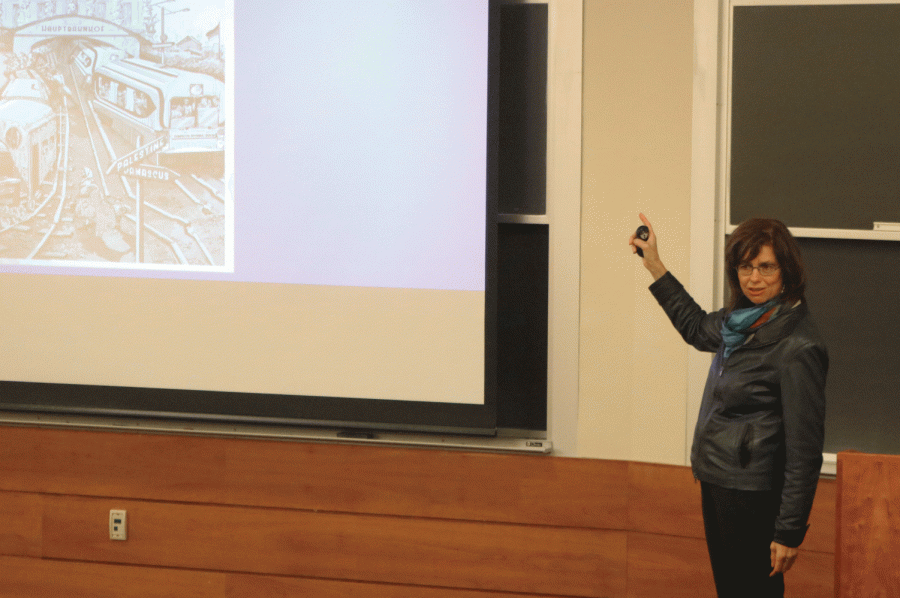Ishay Addresses Freedoms in the Middle East for Lampert Institute Lecture Series
Dr. Michelle Ishay, pictured above, spoke on the current state of human rights in the Middle East. Ishay described her own proposed solution of building a railroad connecting the Middle East as a means to peace.
On Thursday, October 26, Dr. Micheline Ishay from University of Denver’s International Human Rights Program, discussed human rights issues that currently exist in the Middle East and their causes.
The main fundamental freedoms that Ishay describes are freedom of speech, freedom of religion, freedom from want, freedom from fear and freedom from sexual discrimination. In the part of the process Ishay calls “departures,” she described the mechanisms through which human rights have been lost in various Middle Eastern countries. She believes the recent outbreak of uprisings in the Middle East are caused by a weakening of the international order, the wide dissemination of human rights ideas, along with various domestic, political and economic crises.
All of these factors are coupled with new media outlets that can act as new spaces for mobilization of the population. However, Ishay did note that not all of the revolts in the Middle East came from the same governmental context. Some of the nations had deeply divided authoritarian regimes, some were wealthy gulf monarchies and others were semi-homogenous initiators.
Each of these revolts in the Middle East were founded on human rights ideals. However, as Ishay described it, the human rights conditions in each of these countries that experienced revolts, besides Tunisia, are worse than they were before. This is the part of the process that Ishay called, “derailment.” The cause of this derailment, Ishay primarily attributes to the way that nationalist and religious ideological fervor have filled the void of liberal government ideals.
Countries in the Middle East face the challenge of creating a government that is tailored to their needs and unique from the cultural history of countries like the U.S. that have a governmental foundation in liberal, democratic, ideals.In most Middle Eastern countries, the only certainties are tangible things like family, religion and the familiar places of belonging that follow these cultural institutions.
The third and final stage of the journey toward a Middle East that caters to the basic human rights Ishay established is called “rerouting.” Ishay posed the question of how a more hopeful vision can be created and how the people can reclaim the fundamental human rights that they aspired in 2011 and 2012.
The unique solution Ishay provided is the creation of a physical train and railroad in the Middle East. This train, as proposed by Ishay, would create jobs, attract new industries and tourists and allow for labor mobility within these countries. Through the creation of this train, some degree of economic growth would hypothetically be created. As a result of this increased economic stability, Ishay argues that fundamental human rights could potentially be established.
Throughout the entirety of the lecture, Ishay also used a train she called “the Levant Express” as a metaphor for the various stages in the “derailment” of fundamental human rights in the Middle East. This idea was meant to convey the political and human rights journey that many countries in the Middle East have experienced over the past decade.
This metaphor resonated with first-year Carina Haden.
“Dr. Ishay’s ‘Levant Express’ metaphor is an interesting way of expressing the deep complexity of the human rights issues in the Middle East,” Haden said.
Sophomore Ally Feldman reflected on Ishay’s proposed solution of a literal train to stabilize the Middle East.
“Micheline Ishay’s vision of a physical manifestation of the connection between Arab states as a train running through the Middle East is a provocative one, but one that she grounded in impressive research. Ishay’s hope is that this connection would rekindle economic and political stability, as well as an increase of general freedom, in the region,” Feldman said.
Contact Shelby Stevens at [email protected]







